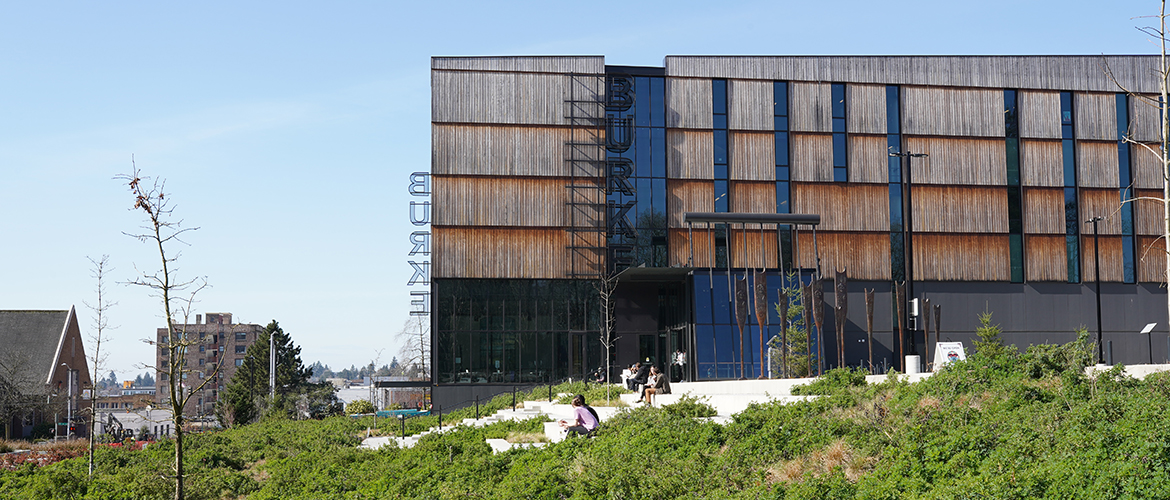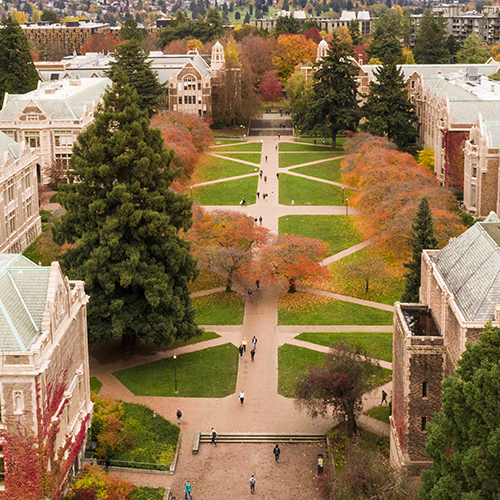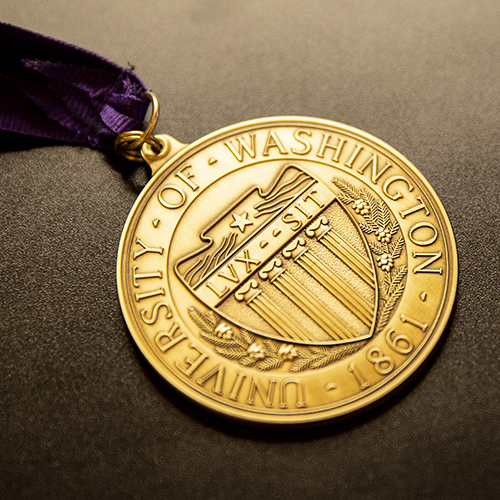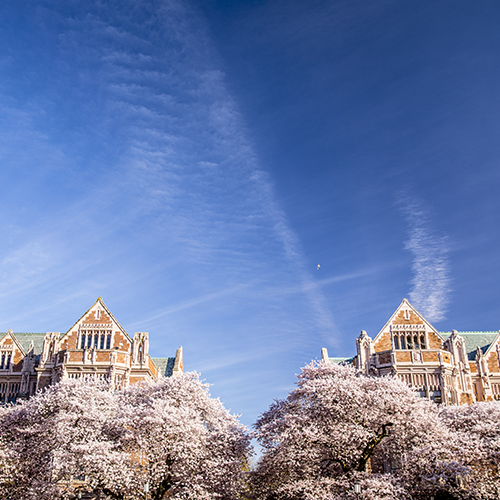Featured Awards:
Accolades for Diversity in Classics
Awards Pile Up for Burke's New Building
Francis and Wilson among "1,000 Inspiring Black Scientists"
Honoring "Mathematical Beauty and Relevance"
Sophomore and Junior Medalists from Arts & Sciences
Other Awards:
Honorary Awards
Publication Awards
New Professorship & Chair Appointments
Other Honors
Accolades for Diversity in Classics
At a 2019 meeting of Classics scholars, Christopher Waldo, assistant professor in the UW Department of Classics, got to chatting with a colleague from Brown University. As Asian American classicists, they wished there were a professional organization that could provide a sense of community for Asian and Asian American classicists.
That initial conversation led to others, and within months the Asian and Asian American Classical Caucus (AAACC) was founded, with UW’s Waldo as president. Now the young organization has received the WCC Professional Equity Award from the Women’s Classical Caucus, as “an institution that has taken measures to improve equality and diversity in our field, whose culture is a model for other institutions.”

AAACC aims to build a vibrant community of Asian and Asian American classicists and promote scholarship that explores issues of classical reception in Asian and Asian American culture. The organization hosts workshops and panels at academic conferences, and offers a mentorship program that provides both traditional mentoring and peer-to-peer connections.
“We had all been silently existing alone in personal silos of our own making, without realizing that we were missing the power, comfort, and support of an Asian community in Classics,” remarked AAACC vice president Elizabeth Wueste (The American University in Rome) in a Society for Classical Studies (SCS) interview. “…When we gave our individual cultural experiences a designated place to interact, dialogue, and play, the results were powerful.”
Waldo sees the WCC Professional Equity Award as important acknowledgment of AAACC’s work, and motivation to continue building the organization. “I hope that the amplification of our message that will come with winning this award will draw more people into our organization,” he said in the same SCS interview. “Building community is perhaps the most important thing that we do.”
Read the full SCS interview with Waldo, Wueste, and other AAACC leadership.
Awards Pile Up for the Burke’s New Building
The architecture community has spoken. The new Burke Museum, completed in 2019, has earned numerous accolades from the American Institute for Architects (AIA) and other design groups, and was named a “Building of the Year” finalist by the Seattle Daily Journal of Commerce.

The building, located on the UW’s Seattle campus, houses more than 18 million artifacts and specimens, ranging from canoes to totem poles and mammal skulls to dinosaur fossils. The new Burke breaks down traditional museum barriers for the public with an "Inside-Out" design that integrates collections and research labs with traditional galleries. The result is an experience that invites everyone — from curators to visitors, educators to students — to engage in the process of scientific and cultural discovery.
Recent design honors for the Burke include: AIA Seattle Honor Awards for Washington Architecture, Award of Honor, 2020; AIA Washington Council Civic Design Awards, Honor Award, 2020; AIA Northwest and Pacific Region Design Awards, Honor Award, 2020; Seattle Daily Journal of Commerce, Building of the Year Finalist, 2019; Gray Awards 2020, Pacific Northwest Best of Show; FX International Interior Design Awards, Winner, Museum or Exhibition Space, 2020; and Architect's Newspaper Best of Design Awards, Honorable Mention, Cultural Category, 2020.
Haven’t yet seen what the fuss is all about? The Burke Museum is currently open Tuesdays through Sundays, with pre-purchased, timed tickets required and visitor safety protocols in place. Visit the Burke’s website for details and any COVID-related updates. The Burke is located at 15th Avenue NE, just below NE 45th Street.
Francis and Wilson Among “1,000 Inspiring Black Scientists”
Seven University of Washington scientists, including two from the College of Arts & Sciences — Tam’ra-Kay Francis and Bobby Wilson — are included in Cell Mentor’s list of 1,000 inspiring Black scientists, published in December 2020. Cell Mentor is a collaborative resource between Cell Press and Cell Signaling Technology.
“The list was compiled to honor the Black scientists for their efforts in research, diversity and inclusion initiatives, advocacy, social justice outreach, teaching, and mentorship,” wrote Antentor O. Hinton, Jr., a postdoctoral scholar at the University of Iowa and co-author of the list. “The hope was that the list…would serve as a reference for those looking for prominent scientific speakers who could further emphasize the importance of diversity.”

Tam’ra Kay (TK) Francis, a postdoctoral fellow in the Department of Chemistry, studies pedagogies and other interventions in higher education that support underrepresented students in STEM. She created PR2ISM, a program dedicated to sharing equity-minded practices in STEM instruction and research, with the goal of improving student access and success. (See PR2ISM featured in Perspectives newsletter).
Bobby Wilson is an assistant professor of mathematics. His research and teaching involve harmonic analysis — a mathematical procedure for describing and analyzing phenomena of a periodically recurrent nature, such as sound waves, electric currents, and tides.
Other UW researchers on the list include Warren Buck, chancellor emeritus of UW Bothell; James Carothers, associate professor of chemical engineering; Franck Kalume, associate professor neurological surgery; Ayokunle Olanrewaju, acting assistant professor of mechanical engineering; and Jessica Ray, assistant professor of civil & environmental engineering. Learn more about all of the UW honorees.
Honoring “Mathematical Beauty and Relevance”
Gunther Uhlmann, Walker Family Endowed Professor of Mathematics, is joining his heroes. When he was named recipient of the 2021 George David Birkhoff Prize in Applied Mathematics, Uhlmann remarked that “several of the previous recipients of the award are some of my mathematical heroes.”
The Birkhoff Prize is awarded every three years by the American Mathematical Society (AMS) and Society for Industrial and Applied Mathematics (SIAM) for outstanding contributions to applied mathematics. The announcement of this year’s award noted that Uhlmann’s work “is distinguished by its mathematical beauty and relevance to many significant applications, especially in medical imaging, seismic prospecting, and general inverse problems.”

Daniel Pollack, Arts & Sciences divisional dean of natural sciences, describes Uhlmann as a pioneer and world leader in the foundations and applications of inverse problems. “He, and the large numbers of students and postdoctoral researchers who have worked with him at the University of Washington, have had an enormous international impact on this area of mathematics,” says Pollack. “It is wonderful to see him so appropriately recognized with the prestigious Birkhoff Prize.”
Sophomore and Junior Medalists from Arts & Sciences
From the thousands of undergraduate students at the University of Washington, three are selected each year for the prestigious President’s Medalist Award, based on their high GPAs, rigor of classes, and number of Honors courses. In the most recent group, two of the three recipients are from Arts & Sciences.
Sam Colgan, junior medalist, is majoring in English and economics. “Much of my time at the UW has involved critically reexamining the city by learning about early Seattle history,” says Colgan, who is particularly interested in the causes and consequences of gentrification, globalization, homelessness, and urban decay. Colgan decided to study economics to better understand Seattle history as well as the current housing crisis and rising cost of living. He has received the Economics Department's George & Pearl Corkery Memorial Scholarship. Through his English major, he is learning how to explain those greater forces at work through his own story — and the stories of others.

Natasha Lavides, sophomore medalist, is a psychology major with a minor in education, learning and society. “I love working with people, and if there’s one thing I want to do for the rest of my life, it would be that,” explains Lavides, who currently helps other students as a peer academic advisor and advising student associate. She’s also worked as a research lab assistant and interned with the Asian Student Commission, giving her the opportunity to interact with a wide cross-section of campus.
While the pandemic prevents the University from holding the customary UW Undergraduate Medalists Reception, each recipient had their medal delivered to their home, along with a message from UW President Ana Mari Cauce and a celebratory gift.
Other Honorary Awards
Ivana Bozic, assistant professor of applied mathematics, has been awarded an NSF CAREER award. CAREER awards are the National Science Foundation's most prestigious awards for junior faculty, awarded to teacher-scholars for their excellence in research and education, and the integration of the two.
Charles Campbell, professor of chemistry and B. Seymour Rabinovitch Endowed Chair in Chemistry, was selected as an Honorary Fellow of the Chinese Chemical Society to recognize his “international academic achievements and reputation.” This is the highest honor that the Society bestows, granted to chemists who have made significant contributions to the advancement of chemistry.
Sharon Hargus, professor and associate chair of the Department of Linguistics, received the Kenneth L. Hale Award from the Linguistic Society of America, which recognizes scholars who have done outstanding work on the documentation of a particular language or family of languages that is endangered or no longer spoken. Hargus was selected for her decades of tireless work with three endangered Athabaskan languages of Alaska and the Pacific Northwest, as well as the Yakima Sahaptin language of Washington state. She also is providing a legacy of Athabaskanists and other linguists she has trained, who are themselves now devoted to the preservation of endangered languages.
Samson Jenekhe, professor of chemistry and chemical engineering, received the 2021 Polymer Physics Prize from the American Physical Society, which recognizes outstanding accomplishments in polymer physics research. Jenekhe, the Boeing-Martin Professor of Chemical Engineering, was recognized for work on semiconducting polymers for electronic and photovoltaic applications.
Neal Koblitz, professor of mathematics, is one of two winners of this year's Levchin Prize, which honors major innovations in cryptography that have had a significant impact on the practice of cryptography and its use in real-world systems. Koblitz and Victor Miller (Center for Communications Research, Institute for Defense Analyses) were recognized for inventing elliptic curve cryptography, or ECC -- the basis of almost all modern cryptographic software libraries in wide use. Today ECC is used for key exchange, digital signatures, public key encryption, and many other applications.
Izumi Matsuda-Kiami, teaching professor of Asian languages and literature, is the 2021 Leslie Birkland Award recipient from the Washington Association of Teachers of Japanese (WATJ). The award is the highest honor a Japanese teacher can receive in Washington state. WATJ notes that Matsuda-Kiami actively promotes connections and communication amongst college, university, and public K-12 education teachers to foster community, unity, and continuity in Japanese education.
Andrew Meltzoff, Job and Gertrud Tamaki Endowed Chair in Psychology and co-director of the Institute for Learning & Brain Sciences (I-LABS), has been awarded the American Psychological Association’s G. Stanley Hall award, for “distinguished contributions to developmental psychology, including contributions in research, student training, and other scholarly endeavors.” Much of Meltzoff’s work focuses on brain development in children, including studies investigating how children acquire racial biases. “It is thrilling to be a developmental psychologist in the 21st century,” Meltzoff writes. “Modern techniques allow us to investigate longstanding questions about the development of the social mind. And our subjects never disappoint.”
Kristina Scharp, assistant professor of communication, has received the inaugural Leslie A. Baxter Early Career Award in Family Communication from the National Communication Association. This award honors a scholar who has established an important role in shaping family communication research within eight years of having earned their Ph.D. degree.
Farbod Shokrieh, assistant professor of mathematics, was awarded a CAREER grant by the National Science Foundation, which will provide a yearly extended research experience for graduate students on projects at the intersection of combinatorics, tropical geometry, and arithmetic and Arakelov geometry.
Ashleigh Theberge, assistant professor of chemistry, received a 2021 Sloan Research Fellowship from the Alfred P. Sloan Foundation, in recognition of distinguished performance and a unique potential to make substantial contributions to her field. Theberge’s research group studies chemical mechanisms underlying inflammation and disease, and develops analytical chemistry tools to advance medicine, including microfluidic systems for cell culture and portable self-administered blood and environmental sampling systems to study the human immune response anytime, anywhere.
The UW Center for Human Rights received the William O. Douglas Award from the ACLU of Washington for long-standing dedication to social change and justice, and rigorous research and partnerships in response to Washington’s role in the immigration detention/deportation pipeline. “The ACLU-WA and our allies rely on the Center’s solid data and analysis to carry out our work on the ground,” the ACLU noted.
Alexandra Velian, assistant professor of chemistry, has been named a Cottrell Scholar by the Research Corporation for Science Advancement, for the quality and innovation of her research program and her academic leadership skills.
Sam Wasser, research professor in the Department of Biology, and his Center for Conservation Biology, were honored by the National Intellectual Property Rights Coordination Center (IPR Center) as one of 32 recipients of its 2020 Partnership Awards. The award was in recognition of their collaborative work to combat transnational environmental crime.
Matt Yankowitz, assistant professor of physics, has been awarded the 2021 Lee Osheroff Richardson (LOR) Science Prize for North America and Latin America, which promotes and recognizes the novel work of young scientists working in low temperatures and/or high magnetic fields in the Americas.
Publication Awards
Bettina Judd, assistant professor of gender, women & sexuality studies, received the 2020 Claire G. Moses Award from Feminist Studies for the most theoretically innovative article published in the journal in 2019. Judd was selected for her article “Sapphire as Praxis: Toward a Methodology of Anger,” in which she “beautifully weaves together poetic responses to current events, autobiography, television, and music, offering an illuminating example of the varied registers in which Black feminist theory is practiced."
New Professorship & Chair Appointments
Briana Abrahms, assistant professor of biology, was appointed the Boersma Endowed Chair in Natural History and Conservation.
Andy Connolly, professor of astronomy and director of the eScience Institute, was appointed to the Arts & Sciences Dean’s Fund Term Professorship.
Aria Fani, assistant professor and co-director of Persian and Iranian Studies, was appointed to the Elahé Omidyar Mir-Djalali Professorship in Persian and Iranian Studies
Geoffrey Korf, executive director of the School of Drama and professor of lighting design, was appointed the Floyd and Delores Jones Endowed Chair in the Arts.
Other Honors
Tom Daniel, professor of biology, was among a team of researchers awarded the Collaborative Science Award by the American Heart Association. The collaborative grant, titled Multi-Scale Computational Modeling in Genetic Cardiomyopathies, brings together three complementary areas of expertise: molecular cardiovascular biology, cardiac physiology and muscle mechanics, and computational biology.
Bill Frisell, affiliate professor of jazz studies in the School of Music, was nominated for a Grammy Award for Best Contemporary Instrumental Album in the Contemporary Instrumental Music category, for his album AMERICANA with Grégoire Maret and Romain Collin.
Jennifer Salk, associate professor of dance, received the Mellon Foundation Creative Artist Fellowship for 2020-21. Salk also received a Mellon Foundation Course Development Award.
Smadar Ben-Natan, Benaroya Fellow in Israel Studies at the Stroum Center for Jewish Studies, has received a grant from the Harry Frank Guggenheim Foundation for research on the treatment of political prisoners in Israel, and how systems of incarceration can either foster radicalization or further reconciliation.
Nathalie Williams, associate professor of international studies and sociology and head of the doctoral program in international studies in the Jackson School of International Studies, has been named by the Center for Migration Studies of New York as co-editor of International Migration Review (IMR), the premier social science journal in the field of international migration, ethnic group relations, and refugee movements.
More Stories

Awards for Research, Social Justice Efforts & More
Recent awards celebrate Arts & Sciences faculty, staff, and alumni for their research, social justice work, lifetime achievements, and more.

2025 UW Awards of Excellence
Arts & Science faculty and staff were among the recipients of 2025 UW Awards of Excellence for their teaching, leadership, and innovation.

Meet Our 2025 Graduate Medalists
Meet the four graduating students selected by the College of Arts & Sciences as 2025 Graduate Medalists for their accomplishments.